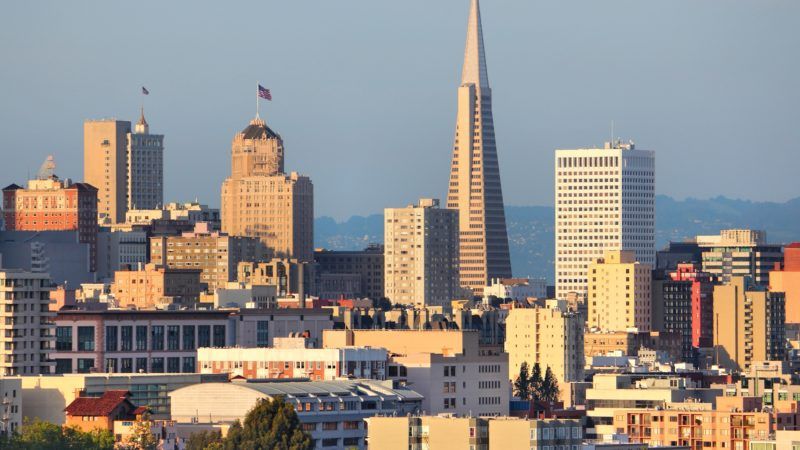San Francisco Has Added a Lot of Jobs but Not Enough Housing.
City Voters Approved a Ballot Initiative That Cuts Back on the Jobs.
The city's voters, politicians, and activists should stop trying to dictate how exactly their city will change over the years. They’re not very good at it.

(Tupungato/Dreamstime.com)
San Francisco has created a lot more jobs than housing in recent years, helping to make it one of the most expensive places in the world to live. To fix this imbalance, city residents have voted for a ballot measure that would restrict the development of new office space until the city starts building enough affordable housing. Whenever it gets around to that.
On Super Tuesday, 55 percent of San Francisco voters ticked yes on Prop E. The complicated ballot measure would revise the city's existing cap on large office developments (set at 875,000 square feet per year) downward by the same percentage that it falls short of its affordable housing goals.
So if San Francisco builds only 90 percent of the affordable housing units it has given itself the goal of completing (which is currently about 2,000 units a year), the amount of office space that can be permitted that year will also fall by 10 percent.
"Either we're going to significantly increase our affordable housing or reduce our office development," John Elberling, the sponsor of the initiative, said to CityLab in January. "It's going to be one or the other."
It could also be neither.
Prop E doesn't appropriate any new money to build affordable housing (a technical term meaning income-restricted units that are rented out at below-market rates). Nor does it streamline permitting or remove zoning restrictions that would make it easier to build such projects.
"All [Prop E] could do is reduce future office development," notes SPUR, a Bay Area think tank, which also points out that less office development would also mean less money for affordable housing. "Reducing office development would also reduce impact fees that pay for affordable housing—precisely the opposite of the measure's goal."
Proponents made a couple of arguments for the ballot measure. One is that it boosts affordable housing production in the short run by grandfathering in several large office developments that are already in the pipeline and that come with an affordable housing component.
More broadly, Elberling has argued that linking housing and office development will give commercial developers and business interests an incentive to support more affordable housing funding in the long-run. So even if the measure itself doesn't create affordable housing, they think it could create the political will to get the job done. Four-dimensional chess by ballot measure.

It is possible that Prop E will succeed in creating this powerful pro-affordable-housing coalition, which will then go on to get the hundreds of millions of additional funding needed to build all the affordable housing the city needs, and then triumph over the NIMBYs who frequently delay these projects. But there is also—how shall I put this?—a fair chance that this won't happen.
Meanwhile, Prop E comes with some pretty concrete costs. Given the city's chronic inability to meet its affordable housing goals, City Controller Ben Rosenfield found that Prop E would have reduced allowable office space development by a cumulative 5.6 million, and net tax revenues by $4–7 million per year, had it been in place for the last decade. Alternatively, the city would have had to spend $200–500 million more each year over the same time period to meet its affordable housing goals, and thus avoid any reduction in allowable office space development.
Opponents of Prop E argue it would reduce impact fees paid by office space developers by $600–900 million over the next 20 years. A reportfrom the city's chief economist estimates that city GDP will be 8.5 percent lower by 2040 than it would have been without Prop E.
Artificially capping the amount of new office space that can be built would also likely raise office rents, pushing out smaller businesses that can't outbid deeper-pocketed corporations for existing space. After all, that's what supply constraints have done to the city's housing market.
The city is still counting mail-in ballots from Tuesday's election, so Prop E's victory isn't official yet. But "barring unforeseen lunacy", as Mission Local put it, the measure will easily pass.
That really is a shame. San Francisco has continually tried to plan itself out of its housing affordability problems through limits on the "wrong" kinds of development, whether that's buildings that are too big, too luxurious, or now, come with too many jobs. These efforts have failed to work. San Francisco voters, politicians, and activists should stop trying to dictate how exactly their city will change over the years. They're not very good at it.
